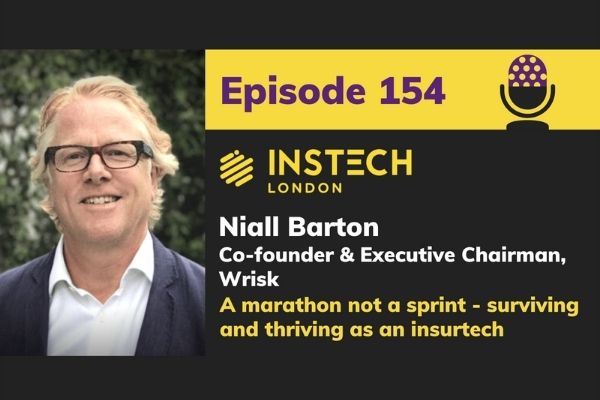For insurtechs to flourish, companies need to match their innovative technology solutions with market opportunities and an understanding of how the industry works.
Some of the best innovation in recent years has come from combining new technology with deep insurance knowledge and experience, and this week’s podcast guest is a great example. Originally an underwriter, Niall Barton co-founded Wrisk in 2015 and has gone on to become one of the leading figures in the UK insurtech scene.
Niall joins Matthew on Podcast 154 to discuss the growth of Wrisk, his experiences as a founder, developing insurance technology solutions, and building a business during Covid-19 lockdowns.
Listen now to learn about:
- Changing careers and advice for aspiring founders
- Crowdfunding and working with investors
- Building vs buying technology platforms
- Pivoting a start-up and embedded insurance opportunities
- The growth of the UK insurtech scene
Wrisk was named as one of the companies to watch in our embedded insurance report, Insurance: to Embed, or not to Embed, which is available to download for free on the InsTech London website.
You can contact Niall directly on Linkedin to discuss insurance, technology or holiday homes.
If you like what you’re hearing, please leave us a review on whichever platform you use, or contact Matthew Grant on LinkedIn.
Sign up to our newsletter for a fresh view on the world every Wednesday morning.
Continuing Professional Development
InsTech London is accredited by The Chartered Insurance Institute (CII). By listening to an InsTech London podcast, or reading the accompanying transcript, you can claim up to 0.5 CPD hours towards the CII member CPD scheme.
The Learning Objectives for this podcast are:
- Realise where insurtechs stand in the UK insurance industry
- Understand how to begin solving a technology problem with a start-up
- Discern some of the different ways a start-up can obtain funding
To continue learning about insurtechs, read our insight This is the next stage, not the end, of the insurtech promise.
Let us know you have listened to this podcast and if your organisation is a member of InsTech London you will receive a quarterly summary of the CPD hours you have earned.
To help us measure the impact of the learning, we would be grateful if you would take a minute to complete a quick feedback survey.
A marathon not a sprint – surviving and thriving as an insurtech – Episode 154 highlights
Matthew: After a conventional career in insurance, it’s a bold move to leave and launch a new business. What motivated you to co-found Wrisk?
Niall: Setting up businesses has been an expensive hobby of mine. The first one I set up after leaving Faraday and Berkshire was Oxygen, which was a brokerage and underwriting agency. We had some great successes, but we ended up selling the business. Watching what was going on in the fintech world with the likes of Monza and Revolut, who bring a delightful experience to their customers, made me think how long overdue this was in the insurance world. I wanted to assemble the right team, and I was lucky enough to meet Darius Kumana. We built a prototype and took it to Munich Re’s Digital Partners. They backed us for the UK, Europe and America as an MGA, using their underwriting capital. That got us started and enabled us to raise money.
An enormous amount of stamina is needed to get a business going from scratch. With some lucky breaks and a few bumps in the road, Wrisk is now powering along really well, and I’m delighted with it. Along the way, I’ve learned how to operate more as a tech business than as an insurance business.
Matthew: For those who haven’t come across Wrisk, can you talk a bit about what you offer?
Niall: Wrisk is a digital-first insurance business that works with leading automotive brands to shape their customers’ mobility and insurance experiences. We’re a B2B2C (Business to Business to Customer) player working with BMW, RAC and others, with customers at the heart of our proposition. This appeals to the customer, but it also appeals to the partner in the middle because they want to keep their customers. Wrisk is focused on the mobility space, because we see so much potential in that area.
Matthew: Why did you pivot from B2C to B2B2C?
We started as a B2C proposition and whilst we loved it and the customers loved it, it was going to cost a lot of money to build a brand. MGAs have to be able to significantly scale up distribution, but it’s very hard to break through when there’s a lot of money being spent on branding by the big insurers. It would have been a mountain to climb. We quickly realised it wasn’t for us, and luckily we were introduced to BMW at a good time. Our product is all about embedding insurance.
Matthew: For part of your funding you have used Seedrs, the crowdfunding platform. What was your motivation for doing that?
Niall: It’s important to stress that there is no one way to raise money, and doing it is hard work. We watched how Monzo and Revolut had not only raised money on Seedrs and Crowdcube, but had also built up a following through the process. We decided to give Seedrs a go. It was a lot of work initially to build a deck, to make a compelling video and answer lots of questions from prospective investors. How we answered questions was really important, particularly coming from a new sector – Seedrs hadn’t come across insurtech before. We now have about 2000 investors, which we are incredibly proud of. We’ve hired people who were investors and we’ve used them for testing out versions of our software. Using Seedrs has been about more than just receiving investment funds.
Matthew: Around the same time you set up Wrisk, you also set up Insurtech UK. What were the original aspirations for it, and how has it evolved over the last five years?
Niall: It started as a small group of us that felt we needed a voice, particularly with the government, who at that time were keen on promoting fintech, whilst not doing much for insurtech. At Wrisk we had an issue with HMRC in how they were treating tax breaks for new businesses. It was a frustrating process trying to figure out which association could lobby for insurtech start-ups – we realised that there wasn’t one, so myself and some other founders formed Insurtech UK. Now we have over 100 firms that are members. It’s representative of how fantastic London is as a place to set up an insurtech; there’s great infrastructure, great collaboration and great support. I’m not on the council anymore as it was taking up a lot of my time, but I’m very proud of it. Insurtech UK is mainly a lobbying group for insurtechs, whereas InsTech is so much more about communicating to the outside world what’s going on.
Matthew: Is the UK government looking a bit more favourably at early stage companies now?
Niall: I think we’ve raised the profile of insurtech. I’m not going to wait for handouts from the government – we’ve got to earn our funds from traditional investors. There are areas where it would be great if there was some grant funding, but SEIS and EIS can help get companies on their feet, and that’s enough.
Matthew: Are there any companies that you particularly admire?
Niall: I’m intrigued by what Jaguar Land Rover is doing – it’s going to be an exclusively electric vehicle brand from 2025. Motor manufacturers are having to think and move so fast. In the insurance space, Abacai is one to watch. They have a very high quality team and are very productive.
Matthew: How did you decide what technology to build for Wrisk and how to build it?
Niall: There are certain features that can be bought, but to make a difference for the end customer, companies have to build some themselves. This is particularly important in order to build value within the business. We partnered with some companies, but we thought the core had to be our own platform. We’ve had some high quality engineers and we now have very good technology which is scalable. I’m happy with where we are.
Matthew: What was your motivation for changing your role from CEO to Executive Chairman?
Niall: I decided a couple of years ago to hand over the reins of the CEO role to somebody who was better equipped than I am. I’m an insurance guy, and Wrisk is a technology business at its heart. I’m now Executive Chairman. I have spoken to other people who run insurtechs who are nervous to change position, but I recommend it. They shouldn’t have to think they will be in the same role forever. It might be better for the business to bring somebody else in who could do an even better job.
Matthew: What convinced you and your colleagues to join InsTech as a corporate member?
Niall: Every business goes through waves of self publicity. I was conscious that although Wrisk had its burst of activities, we hadn’t done enough inside the market. I’d watched and attended lots of InsTech’s events, but never actually signed up as a member. I really respect and admire what you have created and done for this sector. Your embedded report was something that really caught our eye, and we wanted to contribute to that too.
Matthew: It’s been great speaking to you, Niall. Any final thoughts?
Niall: It’s easy for founders to be dazzled by the success of IPOs and SPACs, but it’s important to remember that businesses have to be sustainable. It’s a marathon, not a sprint. People also have to look after themselves. Last year was a horrible year for everybody. At Wrisk we had some personal and business challenges, but we managed to get through it. People have to make sure they have supportive people around. As a company founder, you have a lot of fun, but there are difficult moments too. It’s important to recognise that.






